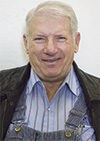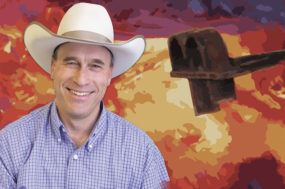I don’t think I had forgotten about it, but I had not thought about it for a long time, either. I can’t remember the stories, but I didn’t get any flak from the other students.
They may not have liked them, but at least the story postponed the inevitable: “All right class, open your language workbooks, with which you will be tortured for the next hour.”
Mrs. Sarnes was the teacher that year. She was almost thin, graying and wore glasses. We as a class treated her with more respect than most schoolteachers.
That may have had something to do with the fact that Mr. Sarnes was a police officer in Nampa, Idaho. He visited the class briefly from time to time, seemingly to pass a message on to his wife. He was in full uniform when he did, including his sidearm.
I remember Mrs. Sarnes being upset with me only one time. In our classroom was a mini-library, and among the books was an age-appropriate set of biographies of presidents of the U.S. in class, we had class instruction time and study time.
If, during the study time, our work was done, we were allowed to read from the library. One day I was engrossed in something Abraham Lincoln was doing. Whatever it was, I seemed to be there with him, oblivious to being in a classroom.
The sound of Honest Abe’s axe was interrupted by Mrs. Sarnes speaking in an uncharacteristically sharp tone of voice. “Why Bradlee, what are you doing?” she asked. “The rest of the class is taking a spelling test.”
My mind – having traveled 120 years in two seconds – was not in its best form, as I heard myself say, “It would be nice if someone would announce these things.” She was not happy with me, but quickly repeated the first half of the test.
It took my perfect score on the spelling test to keep me out of the doghouse that day.
I remember claiming to not like school, only to have my mother correct me. It seemed tedious and boring, with its saving grace being that it didn’t take much effort on my part to do better than most of the others.
That may have been my downfall in school – fifth grade and on through college. I never had to study very much or very hard to stay out of trouble at home when the report cards came out.
The old Lakeview grade school still stands in Nampa, Idaho. It was an old two-story building plus a full basement. It seemed like the walls were 3 feet thick. It was built in 1892 and fully occupied by about 1894, per the history of the Nampa School District.
After I left the school after sixth grade to go on to junior high school, an addition was added. Finally retired some time ago, it is now the property of a church group.
I remember attending a fundraising spaghetti feed at the school as alumni, then a “big” seventh grader. It seemed strange that in one short year the old building had changed from a “now” place to a “history” place in my life.
I could visit, but my time being there was now past. There was no option for doing things over or doing things any different.
The school years were the time to learn. They were the time to make and sharpen the tools I would need for the rest of my life. The most important was to learn how to learn.
Knowing how to learn, even later in life, will give a person the ability to figure out and conquer new things.
School isn’t about memorizing words, letters and numbers. It’s about getting a vision of how to understand that words, letters and numbers are tools. Before you can get a child to understand that two plus two equals four, the child needs to have a concept of what “two” is.
Knowledge is power. Knowing how to gain more knowledge and having the wisdom to use it is the ultimate power.
If a hay grower understands basic ruminant nutrition and plant anatomy, it’s more likely that the alfalfa hay the hay grower bales will have better-than-average leaf retention.
If the weather forecasters had paid more attention in school, we would be able to get more of the hay baled and stacked before it rained. I hope they are still learning. They, like the rest of us, have yet to perfect their art. FG










